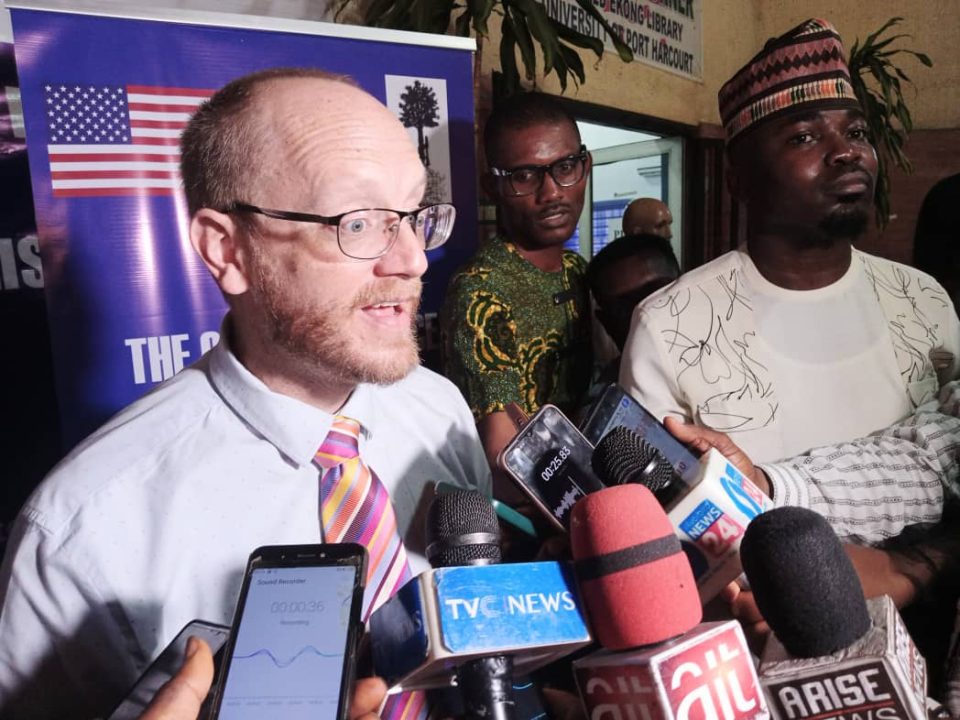By: Felix Ikpotor
The United States of America has reiterated its commitment to ending gas flaring and combating climate change in Nigeria and Niger Delta in particular.
United States Consul General to Nigeria, Will Stevens made the commitment while speaking at an awareness trainning for journalists on Climate Journalism organised by the Office of the United States Consul General in conjunction with Media Awareness and Justice Initiative (MAJI) at the University of Port Harcourt.
He stated that combating climate change is one of the key pillars of President Joe Biden’s administration.
Stevens said they have been working with the National Oil Spills Detection and Remediation Agency (NOSDRA) and other agencies to combat climate change in the country.
“Climate Change is one of the key pillars of President Joe Biden’s administration, he had the first ever Special Presidential Envoy for climate change, Sean Kerry; we invested our commitment to the COP 28, 29 climate agreement.
“We are working hard with Nigeria to ensure that Nigeria continues to make the amazing commitments that they’ve made to combat climate change to reduce flaring and natural gas, to clean up the oil spills that are happening. Right here in Port Harcourt, we worked together with NOSDRA on oil spills in Eleme, we have scientists from the United States Environmental Protection Agency, EPA, to work together to share expertise. It’s about partnering, climate change is a global problem that impacts every citizen in the world, so we need to work together to fight it,” he said.
The Consul General lauded journalists covering the environment for their enormous job in the Niger Delta and in protecting democracy, expressing delight in partnering the media to combat climate change in the Niger Delta.
“Journalism is the foundation of civil society. You are pillars that hold our democracy and so we are so proud to support Nigerian journalists in combating the problems you face so we have to give you this technical trainning.
We believe that when journalists do their jobs, they hold government and the institutions accountable to do the things they say they would do because without that, citizens won’t be informed and democracy will be weak”, he stated.
On his part, the Vice Chancellor of the University of Port Harcourt, Professor Owunari Georgewill said the institution would continue to provide the needed environment for advancement of knowledge while thanking the US Consulate for the trainning.
“The university is a place of knowledge and so as we are doing this, we are doing what the university is established for; to train and give knowledge to people.
“We have identified that journalists who cover the Niger Delta have problems and we have come up with solutions to help them do their work and I believe that at the end of this, the take-home would be how you do your work better as you cover events in the Niger Delta.
“We cannot say enough thank you to them for supporting this our struggle to cover the Niger Delta news-wise,” he stated.
Earlier, Mr. Onyekachi Okoro, Executive Director, Media Awareness and Justice Initiative, MAJI, said the trainning is important for building the capacity of journalists to be able to tell their stories accurately.
“Citizens science is important for media reporting because we understand that news cannot be told one-sided. The Citizens science for newsrooms project is focusing on building the capacity of media, of newsroom journalists, investigative journalist, civil society groups, community based groups.
“Building their capacities, we would be able to tell stories, reports using data in qualitative and quantitative forms. We are also building capacities to be able to engage in data use, we understand that data can only be used if its well aggregated, well analysed, is well visualized and that will help also create more in depth reporting for newsrooms,” he said.
He further explained that the organisation has developed an application to aide in accessing and reporting the quality of air in the Niger Delta and also report spill incidences.
“So we have created a tool, a mobile app that is accessible via iOS and Android devices, that tool will enable journalists to be able to tell stories around environmental incidents in the Niger Delta, they can also tell stories about air quality in the Niger Delta.
“We also remember that sometime ago, we had the issues of carbon particles called soot that was polluting our environment and we didn’t have any contacts to call to quantity it.
“We have an app and we have deployed air quality sensors in certain locations in Port Harcourt and around Rivers State to collect data, this data is aggregated on that app and this app would be able to speak to Journalists while giving them the tools to be able to write their stories more effectively and qualitatively,” Okoro said.

